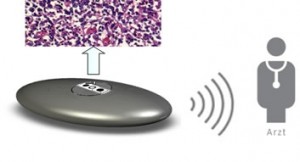Clinical laboratory directors and pathologists will see threats and opportunities as microelectronic devices offer new diagnostic and therapeutic modalities
In vivo clinical diagnostic testing just took a giant step forward. A team of medical engineers at the Technical University of Munich (TUM) have developed a prototype microchip sensor implant designed to continuously monitor tumors remotely.
Internal Detection Device Allows For Remote Monitoring In Real Time
The device, called IntelliTuM (Intelligent Implant for Tumor Monitoring), detects the level of dissolved oxygen in the fluid near the tumor, according to an online article at Technology Review, published by Massachusetts Institute of Technology.
This development demonstrates how in vivo diagnostics may become a reality in coming years. Improvements in technology will give pathologists and clinical laboratory scientists new tools for diagnosing disease and monitoring the progress of a patient. The IntelliTum microchip sensor is an early example of how the in vitro diagnostics (IVD) may be supplemented by in vivo diagnostics.
Currently tumor growth is monitored primarily using various forms of external imaging, that can include CT scans, and MRI. The new device monitors growth aggressiveness electronically and in real time.

This graphic shows the implantable IntelliTum microchip sensor device that researchers at the of Medical Engineering (IMETUM) Technical University Munich developed. The microchip system can continuously monitor growth of a tumor and report its information using a wireless arrangement. This technology innovation shows how ongoing advances in numerous scientific fields will create new capabilities that can be used by pathologists and clinical laboratories to better diagnose disease and monitor the progress of patients. (photo by lme.ei.tum.de)
“We developed the device to monitor and treat slow-growing tumors that are difficult to operate on, such as brain tumors and liver tumors, and for tumors in elderly patients for whom surgery might be dangerous,” explained Helmut Grothe, head of the Heinz-Nixdorf Institute for Medical Electronics at the Technical University of Munich, in comments published by the Technology Review article.
Supports Better-targeted, More Effective Chemotherapy Treatment
“The advantage of an implant over external imaging is that you can monitor the tumor on the go,” added Sven Becker of TUM in the Technology Review story. He pointed out that other advantages include cutting down on hospital visits and uncomfortable procedures.
Eugene Woltering, Professor of Surgery and Neurosciences at the Louisiana State University Health Sciences Center, observed another advantage. “If it could drip some chemo in the affected area, then the local concentration of chemo would far exceed the diluted chemo concentration that would otherwise reach the tumor in the blood’s total volume,” he told the Technology Review.
Woltering, who was not involved in the research, also noted that the question of which patients would be good candidates for the device remains uncertain. He observed that most patients who are not good candidates for surgical tumor removal, may not want surgery to implant the monitoring device. Woltering further noted that the device could be useful in cases of partial surgical tumor removal. In such cases, the implanted device could act as an early warning system of tumor aggressiveness.
The technology behind the IntelliTuM is the innovation of a team of medical engineers led by Bernhard Wolf, Head of the Heinz-Nixdorf Chair for Medical Electronics and Director of Institute of Medical Engineering (IMETUM) Technical University Munich.
The IntelliTuM consists of a self-calibrating sensor, electronics for data measurement and evaluation, plus a transmitter. These are all contained within a biocompatible plastic housing. The device measures approximately two centimeters in length. It is implanted in the patient near the tumor site and transmits data wirelessly to an external receiver worn by the patient. The data is then transferred to the treating physician for remote monitoring and analysis.
So far the device has only been used in cell and tissue culture tests, according to an article at MD5, a website that provides news for medical manufacturers. The IntelliTuM device will have to undergo animal trials before it can be tested in humans.
IntelliTuM Device Shows How Medical Labs Could Go “In Vivo” with Tests
The IntelliTuM sensor is currently calibrated to measure oxygen. Future plans include adding sensors to measure temperature and acidity, as well as other signs of tumor change or growth. Additionally, the developers hope to incorporate a miniature chip which can deliver chemotherapy in a more targeted way. Engineering challenges include shrinking the device even further, so that it can be implanted with minimally invasive surgery, the MD5 article stated.
Here is one more example of how rapid advances in microelectronics and molecular diagnostics are creating innovative ways to diagnose disease and advance patient care. It is a development that should benefit clinical laboratories and the pathology profession.
The IntelliTuM adds a new layer to the in vivo lexicon that could change clinical practices in remarkable ways. The accelerated integration of in vivo and in vitro testing could greatly increase that value that pathologists provide to physicians and their patients.
—Pamela Scherer McLeod
Related Information:
New Implant Can Monitor Tumors Continuously (Tech Rev)
Implanted Sensor Chip To Monitor Tumor Growth
Microelectronics Meets Medicine (m³): Electronic Systems for Diagnosis and Therapy
REUTERS: The Dark Report and Siemens Introduce the World’s First Integrated Molecular Summit




Dear Sir,
I am Dr.Govardhan ( Healthcare Consultant) Wipro Technologies India, I am very much interested in knowing about the cancer monitoring device, how it works, what details it captures, how well the prognosis got be monitored. we have created similar king of software solutions where remote monitoring can be captured an the reports can be delivered to the Doctors and Hospitals in there mobile or laptop through cloud technology. so I kindly request you to provide me the requested details, so that we could come up with a solution in supporting you.
Thanks & Regards
Dr.Govardhan